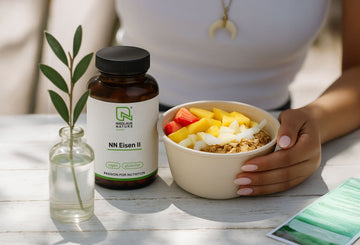Your guide to optimal nutrient intake! Why the right combinations are crucial.
You give your body valuable support with dietary supplements. But when and how you take them makes a real difference. Some vitamins or minerals can enhance each other's effects, while others can even interfere with each other. And the timing of your intake also plays an important role. In this article, you'll learn how to get the most out of your supplementation.
The Basics: What you should know about micronutrients
Micronutrients can be roughly divided into two main groups: vitamins and minerals (including trace elements). Furthermore, fat-soluble and water-soluble vitamins are subdivided. Minerals can be further divided according to their concentration in the body: macronutrients that the body needs in larger quantities (e.g., calcium, magnesium, sodium) and trace elements that the body needs in smaller quantities (e.g., iron, zinc, iodine). Depending on the group, intake, absorption, and combination differ significantly:

-
Fat-soluble vitamins : A, D, E, K – require fat for absorption and are ideally taken before or with a meal. They are stored in adipose tissue and the liver and are important for vision, immune function, cell communication, and protection against oxidative stress.
-
Water-soluble vitamins : Vitamin C and B complex – can be taken at any time of day and regardless of meals. Usually, even on an empty stomach. They cannot be stored long-term in the human body and must therefore be consumed regularly. They play a crucial role in many metabolic processes.
-
Minerals/ Trace elements: Calcium, potassium, magnesium, sodium, and phosphorus are minerals . These make up more than 0.01% of body weight and are present in relatively large quantities in the body. (Major minerals). These each have individual properties and sometimes influence each other during absorption, so they should not be taken at the same time, but rather at different times (e.g., iron should not be taken together with calcium). Also note that some minerals are better absorbed with a meal. Important for bones, cells, energy, nerves, and much more.
Trace elements include chromium, cobalt, iron, fluorine, iodine, copper, manganese, molybdenum, nickel, selenium, silicon, vanadium, and zinc. They occur only in small amounts in the body and should be ingested, for example, through food or as a dietary supplement. They play a central role in many metabolic processes.
In addition to these main groups, there is another important category in dietary supplements that does not traditionally belong to vitamins or minerals/trace elements, but is equally relevant:
- Bioactive substances – such as fatty acids, amino acids, coenzymes, phytochemicals, or probiotics. They cannot be clearly classified as fat- or water-soluble and are not classic minerals. Nevertheless, they play an important role in the body – for example, in cell regeneration, energy metabolism, or the immune system. The recommended intake varies depending on the substance.
What is the best way to take dietary supplements?
Fat-soluble vitamins: A, D, E, K
They require fat for absorption and are ideally taken before or with a meal . They are contained, for example, in these Nikolaus Nature products:
- NN Brain Refresher
- NN Antioxidant
- NN Vitamin D3+K2 MK7
- NN Osteo
- and many more
Water-soluble vitamins: Vitamin C and B complex
These can be taken at any time of day and regardless of meals. Usually, even on an empty stomach. They are contained in these Nikolaus Nature products, for example:
- NN Vitamin C Complex
- NN Thyreo Pusher
- NN Calcium ascorbate
- NN Top@Power
- NN Corvital
- and in many other
Minerals & trace elements : individual intake depending on the product.
- Calcium : take with a meal
- Magnesium : ideally taken in the evening or between meals
- Iron : take on an empty stomach or with vitamin C, not with milk/coffee/calcium
- Zinc : Take between meals, not together with iron or calcium
- Selenium : can be taken with meals
- Copper, manganese, chromium : take separately from zinc and iron
e.g. contained in these products: NN Bonepower® , NN Coral Calcium , NN Magnesium Complex , NN Iron II , NN Selenium , NN Hair & Nail Refresher, NN Zinc Complex
Bioactive substances: individual intake depending on the product.
- Amino acids: take on an empty stomach, at least 30 minutes before eating
- Enzymes: usually recommended before or with a meal
- Coenzymes: best taken with a fatty meal
- Secondary plant substances: best taken with a fatty meal
- Probiotics: fasting, 30 minutes before breakfast
e.g. contained in these products: NN Amino MAP , NN Enzyme Complex , NN Coenzyme Q10 , NN Curcuma Plus , NN Antioxidant , NN Spermidine
These combinations bring you more
Not all nutrients develop their full effect on their own—many work together as a team. By combining them in a targeted way, you can improve their bioavailability and optimally support specific functions in the body. Some vitamins and minerals enhance each other's absorption or effectiveness, while others even activate each other.
Here are a few tried and tested combinations:
- Iron + Vitamin C : Vitamin C improves iron absorption.
- Magnesium + Vitamin B6: B6 supports the absorption of magnesium.
- Vitamin D and Vitamin K2: Vitamin D promotes the absorption of calcium, while Vitamin K2 ensures that the calcium is incorporated into the bones and does not accumulate in the blood vessels.
- Calcium + Vitamin D + K2: Vitamin D helps with the absorption of calcium, K2 ensures that it reaches the bones.
- Zinc + amino acids (e.g. histidine, methionine): Amino acids can bind zinc, making it more soluble and absorbable.
- Vitamin C and Vitamin E: Vitamin C can regenerate oxidized vitamin E – thus restoring and prolonging its antioxidant effect.
- Zinc and Vitamin A: Zinc is important for the formation of the transport protein of vitamin A and thus supports its distribution in the body.
You should avoid these combinations
You should choose certain nutrient combinations carefully, as they can interfere with each other's absorption or weaken their effects. This doesn't mean you should never take these substances together, but you should pay attention to the timing and take them separately.
Here is an overview of the combinations you should not take at the same time :
- Zinc + copper: Both use similar transport mechanisms in the intestine. Too much zinc can inhibit copper absorption. → It's best to take them at different times.
- Zinc + iron: These two minerals compete for absorption. Ideally, iron should be taken in the morning (e.g., on an empty stomach with vitamin C), and zinc in the evening.
- Magnesium + calcium (as individual supplements): In high doses, they compete for the same transport route. → Separate the intake by several hours.
- Calcium + Iron: Both minerals use similar transport routes. → It's best to take them at different times of day.
- Magnesium + zinc: This combination can also lead to competition at high doses. → If possible, take them separately.
- Iron + coffee or black tea: The tannins inhibit iron absorption. → Avoid coffee or tea at least one hour before and after taking iron supplements.
- Vitamin C + Vitamin B12: Large amounts of vitamin C can, under certain conditions, impair the effectiveness of vitamin B12 by reducing or breaking it down in the digestive tract. → Therefore, it's best to take these two vitamins at some intervals—e.g., B12 in the morning, vitamin C later in the morning.
Tip: If you need several nutrients, take them in separate meals, morning and evening.











